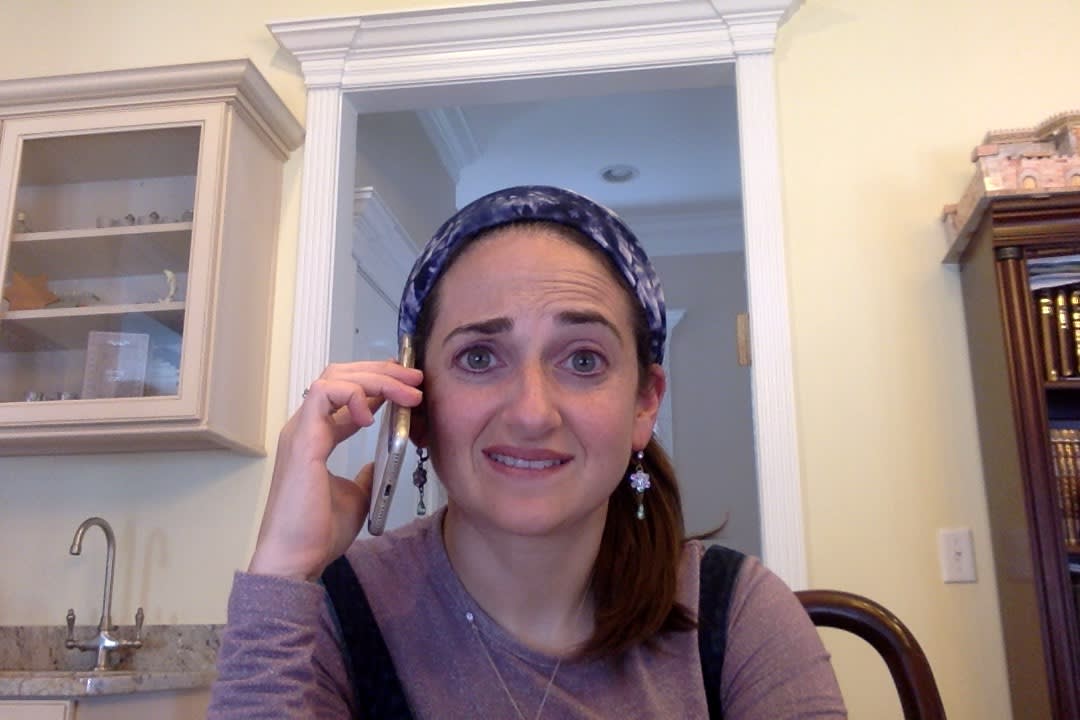I remember buying my first smartphone. I was at a point in my life where aside from calling my friends and family,  there was no need to be constantly available by email, facebook, text, and phone. But there was something appealing about the idea of having the internet at my fingertips and I splurged.
there was no need to be constantly available by email, facebook, text, and phone. But there was something appealing about the idea of having the internet at my fingertips and I splurged.
A lot can change in eight years.
As a Rebbetzin, I use my iPhone to schedule mikvah appointments for women in our community. As a school administrator, I use my phone to email parents and teachers so I can respond immediately and not wait until I get near a computer, lest I forget to respond. I use the Slack app on my phone to communicate with the OU office about articles I write. I use the Facebook app to post pictures from shul events and school events, advertise upcoming programs, share articles I write and wish friends and congregants a happy birthday. Not to mention the calendar, notes, reminders, and clock functions that help me keep my life organized. Having a smartphone enables me to be productive; without my cell phone, I certainly couldn’t take care of half the things I do.
And yet, as I plug in my phone before Shabbos and step away for 25 hours, it is a genuine relief to unplug and to take a break from the constant “binging” of my phone and its various apps that offer quick and effective methods of communication. As I listen to Havdala, it is with dread, knowing the respite from the constant pull of my phone is over… as I will go to check it as soon Shabbos ends.
With our cell phones in our hand, it seems there is no escape from being constantly available. Without strict guidelines, it encroaches into family time, couple time, and my ability to be fully present during meetings. It has even gotten in the way of my 5:30 am walk, which started as setting aside time for myself. But a year into my walking, instead of focusing on the starry morning, the still waters of the river, and most importantly- my thoughts- I find myself using the phone I bring as a safety measure, to write emails to teachers, set reminders for what I need to do, write menus for Shabbos, record ideas for classes I plan to give and WhatsApp my friends in Israel. None of which is a waste of time and I know these are all good and important endeavors. But being so “productive” comes at a cost. My “alone time” which is so necessary for my growth and development is being neglected.
And if I am going to be entirely honest, I would also have to admit that much of my time on my phone is not linked to productivity but as an easy diversion from menial tasks (or my kids’ fighting). It’s just too easy a distraction to check the news, read the latest blog and research the symptoms of yet another disease that I probably don’t have.
I know I am not alone to be struggling with a smartphone addiction. When I walk in the afternoons, I watch the drivers who are sitting behind red lights texting away. I watch couples walking together, texting as they walk. I see children choosing to play on their tablets rather than read a book or play outside. The smartphone has created a society of zombie adults, and now with the devices we buy them, we are passing this plague onto our children. Even this New York Times put out a video recently intimating that as much as iPhones have helped us to progress, they have also led our society to regress: Things the iPhone Helped Destroy
It’s not healthy to be constantly connected and at moments of regret and frustration, I have been tempted to throw my phone into the river. At more serious and contemplative moments, I have looked into downgrading phones and getting a simple model with phone and text, but it’s hard to move backward. I am no longer at that point in life where a smartphone is a luxury; it is truly a necessity to help me manage my life effectively.
And yet, as I take an accounting of my year as we enter the Yamim Noraim, I ask myself, is it worth it? Is it worth all those times that I tell my kids “one minute” because I need to respond to an important message? Is the fact that my husband and I are truly taking care of important things (outreach, speaking with sick congregants, planning funerals…), worth the fact that we spend much of our time together talking with our iPhone beside us, as each “bing” distracts us from what the other is saying? And I wonder: when G-d reviews my year on Rosh Hashanah, how much of my time will have been spent on a,n iPhone, and no matter how worthy my pursuits were at the time, is that how I want my life to appear?
As I’ve been learning the parshiyot of Sefer Devarim, it seems that one warning repeatedly comes up: beware of falling to idolatry. We read these parshiyot as we ready ourselves for Rosh Hashanah and as we are feeling guilty for the many sins for which we will hit our chest, there is that sigh of relief that at least from idol worship, we are innocent. But then I think of the device that is the last thing I check before I go to bed and the first thing I look at when I wake up. I think of how I jump every time I hear a bing and how sometimes a small electronic device takes precedence over everything else in life that I hold dear, and I ask myself, is my iPhone my form of avoda zara?
I am not saying I will give up my iPhone this year. I recognize that most of what I use it for is good, and with my roles, necessary. I know I can’t just simply switch it off, as much as I might like to. But maybe this year, I won’t jump every time I hear a bing representing text, email or notification. Maybe I won’t sleep with my iPhone beside my bed and perhaps, I will reclaim my walks for myself. Maybe I will set my phone aside when I enter my house after school and try to pay better attention to my kids. As I cut down on my iPhone use, I anticipate not being as productive, but it may be that for me, regress is progress this year.
Please see Rabbi Jack Abramowitz’s article on smartphones here
The words of this author reflect his/her own opinions and do not necessarily represent the official position of the Orthodox Union.

